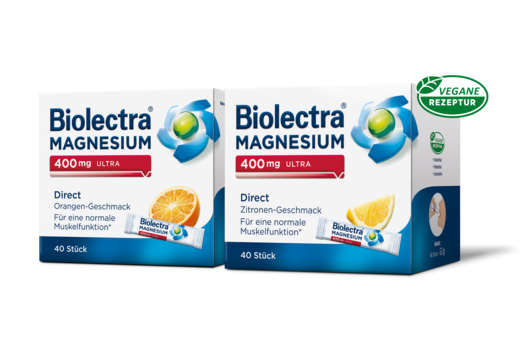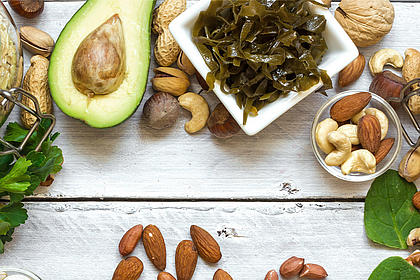Magnesium in Schwangerschaft und Stillzeit

In Schwangerschaft und Stillzeit ist eine gezielte Versorgung mit Magnesium für die Gesundheit von Mutter und Kind unverzichtbar. Es kann daher ratsam sein, Magnesium-Präparate wie die von Biolectra® Magnesium häufig bereits ab Beginn der Schwangerschaft bis zum Ende der Stillzeit einzunehmen.
Steckbrief Magnesium für Schwangere und Stillende
- Was ist Magnesium: Mineralstoff, der vor allem für eine vitale Muskelfunktion wichtig ist („Muskel-Mineral“)
- Bedarf in Schwangerschaft und Stillzeit: 300 mg pro Tag*
- Funktion: zur Unterstützung der Zellteilung, für eine normale Eiweißsynthese, für eine vitale Muskelfunktion sowie zur Verringerung von Müdigkeit und Erschöpfung**
- Magnesium in Lebensmitteln: Bananen, Vollkornprodukte, Erdnüsse, Brokkoli, Bitter-Schokolade, Kartoffeln und Hülsenfrüchte
Wie viel Magnesium in Schwangerschaft und Stillzeit?
Schwangere und Stillende benötigen rund 300 mg Magnesium pro Tag. Aufgrund hormoneller Veränderungen wird Magnesium vermehrt über den Urin ausgeschieden, sodass Schwangere und Stillende besonders auf ihre Magnesiumzufuhr achten sollen.
Außerdem lagert das ungeborene Kind in den letzten drei Schwangerschaftsmonaten bis zu sieben mg Magnesium pro Tag ein. Die Ursache: In dieser Zeit wächst das Kind und verdreifacht sein Körpergewicht – hierfür benötigt es vermehrt Mineralstoffe.
Welche Aufgaben übernimmt Magnesium bei Mutter und Kind?
Das Vital-Mineral übernimmt in der Schwangerschaft vielfältige unverzichtbare Aufgaben für Mutter und Kind. So trägt der Mineralstoff unter anderem zur Verringerung von Müdigkeit und Erschöpfung* bei.
Magnesium ist an vielen Prozessen während der Entwicklung des Kindes beteiligt. Es trägt zu einer normalen Proteinsynthese (Neubildung von Proteinen) und Muskelfunktion bei. Zudem ist das Mineral bei der Zellteilung von Bedeutung.
Woran erkennt man eine Magnesium-Unterversorgung in der Schwangerschaft?
Die Symptome einer Magnesium-Unterversorgung unterscheiden sich in der Schwangerschaft nicht von anderen Lebensphasen. Schwangere klagen auch über Krämpfe im Fuß oder im Gesäß.
Treten Anzeichen einer Magnesium-Unterversorgung auf, sollten Sie sofort handeln und die Ursache der Beschwerden durch den Frauenarzt abklären lassen. Denn nur mithilfe eines Blutbilds und weiteren Untersuchungen kann festgestellt werden, ob eine Magnesium-Unterversorgung Auslöser der Beschwerden ist.
Lässt sich der Magnesiumbedarf mit einer ausgewogenen Ernährung decken?
Der Magnesiumbedarf in der Schwangerschaft und Stillzeit lässt sich durch eine ausgewogene und abwechslungsreiche Ernährung in der Regel gut decken. Doch im Alltag ist es nicht immer möglich, dem eventuell erhöhten Magnesiumbedarf in der Schwangerschaft nachzukommen.
Da Magnesium für die Gesundheit von Mutter und Kind essenziell ist, sollten werdende Mütter umso mehr auf eine magnesiumreiche Ernährung achten: Brokkoli, Bananen, Vollkornbrot, Erdnüsse – es gibt jede Menge leckere Lebensmittel, die reich an dem Mineralstoff sind.
Wer die empfohlene Tagesmenge von 300 mg Magnesium pro Tag erreichen möchte, müsste z.B. etwa 7 Scheiben Vollkornbrot oder 6 Bananen verzehren. Alltagsbedingt ist es oft schwierig die empfohlene Tagesmenge zu erreichen, daher kann die Einnahme eines Magnesium-Präparats hilfreich sein.
Wann sollten Magnesium-Präparate eingenommen werden?
Schwangere und Stillende sollten Magnesium-Präparate nur nach Rücksprache mit ihrem Frauenarzt einnehmen. Tritt eine Magnesium-Unterversorgung auf, lässt sich die Ernährung durch ein Magnesium-Produkt ergänzen. Um einer Unterversorgung vorzubeugen, wird bereits zu Beginn einer Schwangerschaft ein geeignetes Magnesium-Präparat empfohlen.
Welche Vitalstoffe sind neben Magnesium in der Schwangerschaft wichtig?
In der Schwangerschaft ist eine ausreichende Versorgung mit Vitaminen, Mineralstoffen, Spurenelementen und weiteren Vitalstoffen besonders wichtig. Denn jeder Nährstoff übernimmt spezielle Aufgaben, die der Gesundheit von Mutter und Kind zugutekommen.
- Folsäure: Folsäure ist ein wasserlösliches B-Vitamin und während der Schwangerschaft wichtig für das Wachstum des mütterlichen Gewebes, die normale Blutbildung, psychische Funktion, Funktion des Immunsystems und für eine normale Aminosäure-Synthese. Darüber hinaus trägt Folsäure zur Verringerung von Müdigkeit und Erschöpfung bei.
- Jod: Das Spurenelement ist wichtig für eine normale Funktion des Nervensystems, eine normale Produktion von Schilddrüsenhormonen und eine normale Schilddrüsenfunktion sowie zur Erhaltung gesunder Haut.
- Calcium: Der Mineralstoff ist wichtig für die Erhaltung gesunder Knochen und Zähne (für Mutter und Kind!), trägt zu einer normalen Blutgerinnung und Muskelfunktion bei, hat eine Funktion bei der Zellteilung und -spezialisierung und ist für einen normalen Energiestoffwechsel von Bedeutung.
- Vitamin D: Das fettlösliche Vitamin, das vom Körper bei Sonneneinstrahlung in der Haut selbst gebildet werden kann („Sonnenvitamin“), ist für den Erhalt normaler Knochen und Zähne zuständig. Außerdem unterstützt es die Calciumaufnahme und hat eine Funktion bei der Zellteilung.
- Eisen: Das Spurenelement ist an vielen Prozessen im Organismus beteiligt: normale Bildung von roten Blutkörperchen, Sauerstofftransport im Körper, Verringerung von Müdigkeit und Erschöpfung, Zellteilung, Energiestoffwechsel, normale kognitive Funktion und normale Funktion des Immunsystems.



